高一英语必修一Unit2 词汇讲解
- 格式:doc
- 大小:217.00 KB
- 文档页数:6
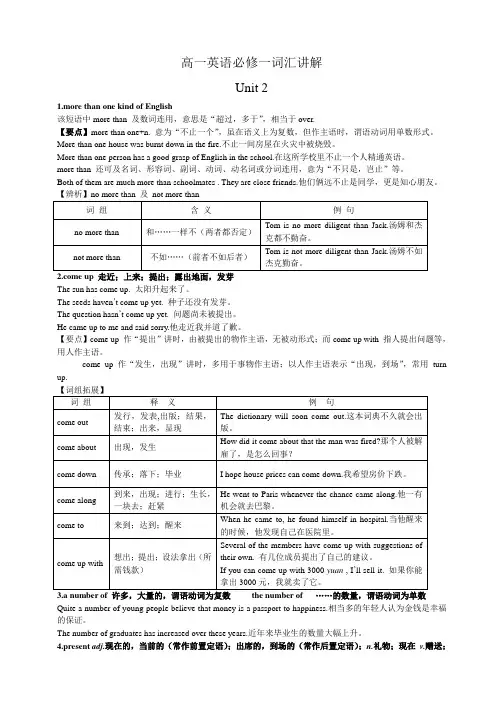
高一英语必修一词汇讲解Unit 21.more than one kind of English该短语中more than 及数词连用,意思是“超过,多于”,相当于over.【要点】more than one+n. 意为“不止一个”,虽在语义上为复数,但作主语时,谓语动词用单数形式。
More than one house was burnt down in the fire.不止一间房屋在火灾中被烧毁。
More than one person has a good grasp of English in the school.在这所学校里不止一个人精通英语。
more than 还可及名词、形容词、副词、动词、动名词或分词连用,意为“不只是,岂止”等。
Both of them are much more than schoolmates . They are close friends.他们俩远不止是同学,更是知心朋友。
【辨析】no more than 及not more thane up 走近;上来;提出;露出地面,发芽The sun has come up. 太阳升起来了。
The seeds haven’t come up yet. 种子还没有发芽。
The question hasn’t come up yet. 问题尚未被提出。
He came up to me and said sorry.他走近我并道了歉。
【要点】come up 作“提出”讲时,由被提出的物作主语,无被动形式;而come up with 指人提出问题等,用人作主语。
come up 作“发生,出现”讲时,多用于事物作主语;以人作主语表示“出现,到场”,常用turn up.3.a number of 许多,大量的,谓语动词为复数the number of ……的数量,谓语动词为单数Quite a number of young people believe that money is a passport to happiness.相当多的年轻人认为金钱是幸福的保证。
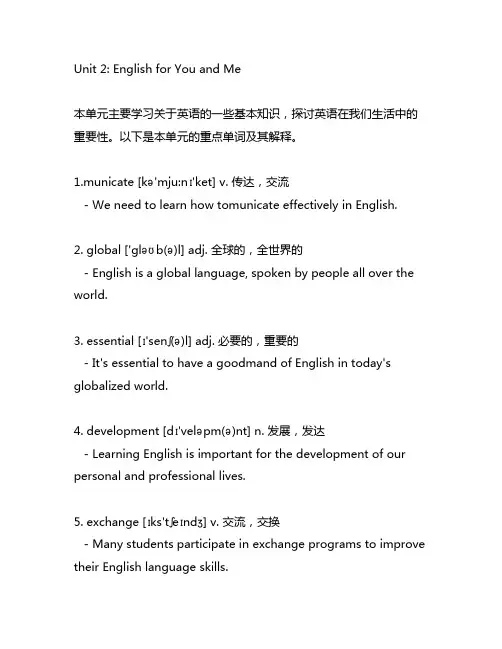
Unit 2: English for You and Me本单元主要学习关于英语的一些基本知识,探讨英语在我们生活中的重要性。
以下是本单元的重点单词及其解释。
1.municate [kə'mju:nɪ'ket] v. 传达,交流- We need to learn how tomunicate effectively in English.2. global ['gləʊb(ə)l] adj. 全球的,全世界的- English is a global language, spoken by people all over the world.3. essential [ɪ'senʃ(ə)l] adj. 必要的,重要的- It's essential to have a goodmand of English in today's globalized world.4. development [dɪ'veləpm(ə)nt] n. 发展,发达- Learning English is important for the development of our personal and professional lives.5. exchange [ɪks'tʃeɪndʒ] v. 交流,交换- Many students participate in exchange programs to improve their English language skills.6. interact [ɪntər'ækt] v. 相互作用,互动- Speaking with native English speakers is a great way to interact and improve one's language skills.7. opportunity [ˌɒpəˈtjuːnɪtɪ] n. 机会,机遇- Learning English opens up new opportunities for travel, work, and internationalmunication.8. challenge ['tʃælɪndʒ] n. 挑战,难题- Learning a new language can be a challenge, but it's also a rewarding experience.9. motivation [ˌməʊtɪ'veɪʃ(ə)n] n. 动机,动力- Finding the right motivation can help you stay dedicated to learning English.10.municate [kə'mju:nɪ'ket] v. 传达,交流- We need to learn how tomunicate effectively in English.11. global ['gləʊb(ə)l] adj. 全球的,全世界的- English is a global language, spoken by people all over the world.12. essential [ɪ'senʃ(ə)l] adj. 必要的,重要的- It's essential to have a goodmand of English in today's globalized world.13. development [dɪ'veləpm(ə)nt] n. 发展,发达- Learning English is important for the development of our personal and professional lives.14. exchange [ɪks'tʃeɪndʒ] v. 交流,交换- Many students participate in exchange programs to improve their English language skills.15. interact [ɪntər'ækt] v. 相互作用,互动- Speaking with native English speakers is a great way to interact and improve one's language skills.16. opportunity [ˌɒpəˈtjuːnɪtɪ] n. 机会,机遇- Learning English opens up new opportunities for travel, work, and internationalmunication.17. challenge ['tʃælɪndʒ] n. 挑战,难题- Learning a new language can be a challenge, but it's also arewarding experience.18. motivation [ˌməʊtɪ'veɪʃ(ə)n] n. 动机,动力- Finding the right motivation can help you stay dedicated to learning English.以上是本单元重点单词的内容,希望大家认真学习,掌握这些词汇的用法和意义,提高自己的英语水平。
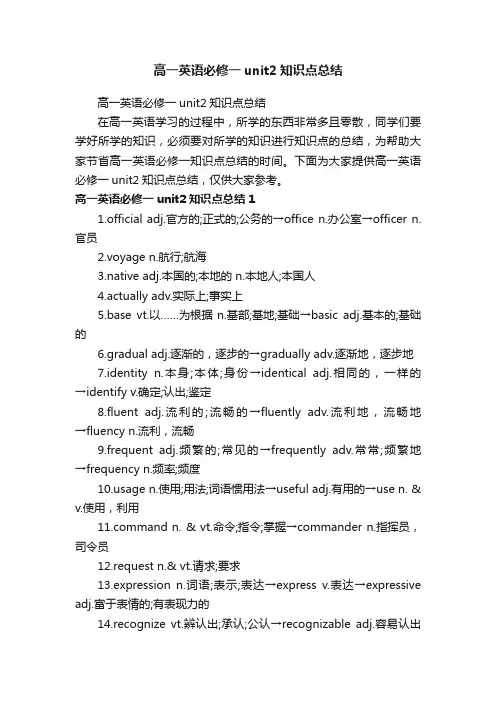
高一英语必修一unit2知识点总结高一英语必修一unit2知识点总结在高一英语学习的过程中,所学的东西非常多且零散,同学们要学好所学的知识,必须要对所学的知识进行知识点的总结,为帮助大家节省高一英语必修一知识点总结的时间。
下面为大家提供高一英语必修一unit2知识点总结,仅供大家参考。
高一英语必修一unit2知识点总结11.official adj.官方的;正式的;公务的→office n.办公室→officer n.官员2.voyage n.航行;航海3.native adj.本国的;本地的 n.本地人;本国人4.actually adv.实际上;事实上5.base vt.以……为根据n.基部;基地;基础→basic adj.基本的;基础的6.gradual adj.逐渐的,逐步的→gradually adv.逐渐地,逐步地7.identity n.本身;本体;身份→identical adj.相同的,一样的→identify v.确定;认出;鉴定8.fluent adj.流利的;流畅的→fluently adv.流利地,流畅地→fluency n.流利,流畅9.frequent adj.频繁的;常见的→frequently adv.常常;频繁地→frequency n.频率;频度age n.使用;用法;词语惯用法→useful adj.有用的→use n. & v.使用,利用mand n. & vt.命令;指令;掌握→commander n.指挥员,司令员12.request n.& vt.请求;要求13.expression n.词语;表示;表达→express v.表达→expressive adj.富于表情的;有表现力的14.recognize vt.辨认出;承认;公认→recognizable adj.容易认出的;易于识别的→recognition n.认出;认识;识别15.accent n.口音;腔调;重音16.lightning n.闪电17.straight adv.直接地;挺直地 adj.直的;笔直的;正直的重点短语1.because of 由于;因为e up 走近;上来3.at present 现在;目前4.make use of 利用5.such as 例如……;像这种的'6.play a part in 扮演一个角色;参与7.ever before 从前8.even if/though 即使9.be based on 以……为基础10.over time 长期以来11.in the early days 在早期12.the same as 相同于●重点句型1.Today, more people speak English as their first, second ora foreign language than ever before.如今说英语的人比以往任何时候都多,他们有的把英语作为第一语言来说,有的把它作为第二语言或外语。
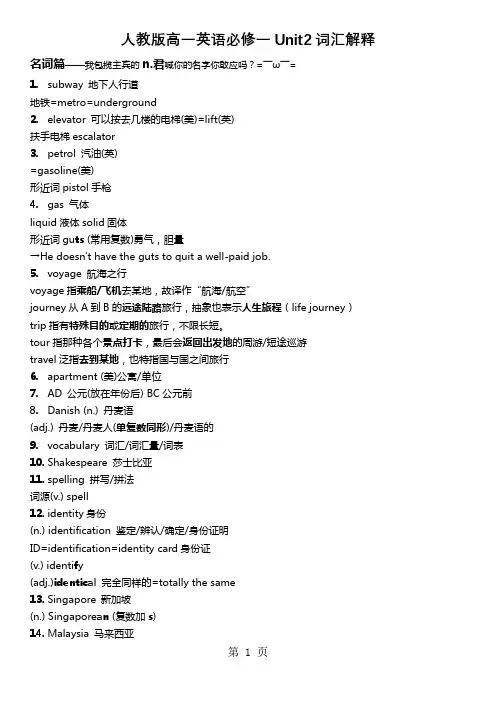
人教版高一英语必修一Unit2词汇解释名词篇——我包揽主宾的n.君喊你的名字你敢应吗?= ̄ω ̄=1.subway 地下人行道地铁=metro=underground2.elevator 可以按去几楼的电梯(美)=lift(英)扶手电梯escalator3.petrol 汽油(英)=gasoline(美)形近词pistol手枪4.gas 气体liquid液体solid固体形近词gu ts (常用复数)勇气,胆量→He doesn't have the guts to quit a well-paid job.5.voyage 航海之行voyage指乘船/飞机去某地,故译作“航海/航空”journey从A到B的远途陆路旅行,抽象也表示人生旅程(life journey)trip指有特殊目的或定期的旅行,不限长短。
tour指那种各个景点打卡,最后会返回出发地的周游/短途巡游travel泛指去到某地,也特指国与国之间旅行6.apartment (美)公寓/单位7.AD 公元(放在年份后) BC公元前8.Danish (n.) 丹麦语(adj.) 丹麦/丹麦人(单复数同形)/丹麦语的9.vocabulary 词汇/词汇量/词表10.Shakespeare 莎士比亚11.spelling 拼写/拼法词源(v.) spell12.identity身份(n.) identification 鉴定/辨认/确定/身份证明ID=identification=identity card身份证(v.) identi f y(adj.)identical完全同样的=totally the same13.Singapore 新加坡(n.) Singapore an (复数加s)14.Malaysia 马来西亚(n.) Malaysian (复数加s)age用法/用量,词语习用法→a book on modern English usage→water usage词源(n./v.) useuse作n.时是“使用/用处”的意思→the use of nuclear weapon→no use to me对我无用处mand-1(n.) command er指挥官a) 控制under/at sb’s command受某人控制→The team is under/at my command.at sb’s command运用自如→a pianist with the keys at his commandin command of sth.→He felt fully in command of the situation. 他觉得完全控制了场面。
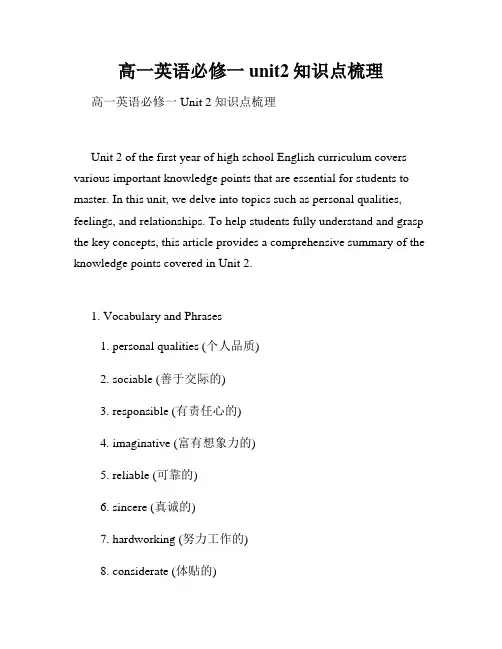
高一英语必修一unit2知识点梳理高一英语必修一Unit 2 知识点梳理Unit 2 of the first year of high school English curriculum covers various important knowledge points that are essential for students to master. In this unit, we delve into topics such as personal qualities, feelings, and relationships. To help students fully understand and grasp the key concepts, this article provides a comprehensive summary of the knowledge points covered in Unit 2.1. Vocabulary and Phrases1. personal qualities (个人品质)2. sociable (善于交际的)3. responsible (有责任心的)4. imaginative (富有想象力的)5. reliable (可靠的)6. sincere (真诚的)7. hardworking (努力工作的)8. considerate (体贴的)9. understanding (善解人意的)10. courageous (勇敢的)2. Grammar Points1. Comparative and superlative forms of adjectives (比较级和最高级形式的形容词)- Examples: "more sociable," "the most imaginative"2. Prepositional phrases of time and place (时间和地点的介词短语)- Examples: "on a sunny day," "at school"3. Verbs followed by gerunds or infinitives (动词+动名词或不定式)- Examples: "enjoy doing," "decide to do"3. Reading Comprehension1. Reading strategies (阅读策略)- Skimming and scanning- Understanding context clues2. Text analysis (文本分析)- Identifying main ideas and supporting details- Making inferences and predictions3. Vocabulary in context (上下文词汇理解)- Using context to determine meaning4. Writing Skills1. Descriptive writing (描写性写作)- Using adjectives and adverbs to create vivid descriptions- Organizing ideas and details logically5. Speaking and Listening1. Giving opinions and expressing agreement/disagreement (表达观点和赞同/不赞同)2. Effective communication strategies (有效的交流策略)- Active listening- Asking for clarification6. Cultural Awareness1. Understanding cultural differences (理解文化差异)- Personal qualities valued in different cultures- Etiquette and social normsBy reviewing and consolidating these knowledge points, students will be better prepared to understand and communicate effectively in English. It is essential to practice and apply these concepts in various contexts, both inside and outside the classroom, to enhance language proficiency.。
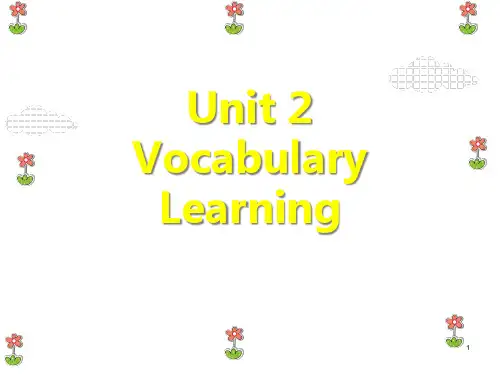
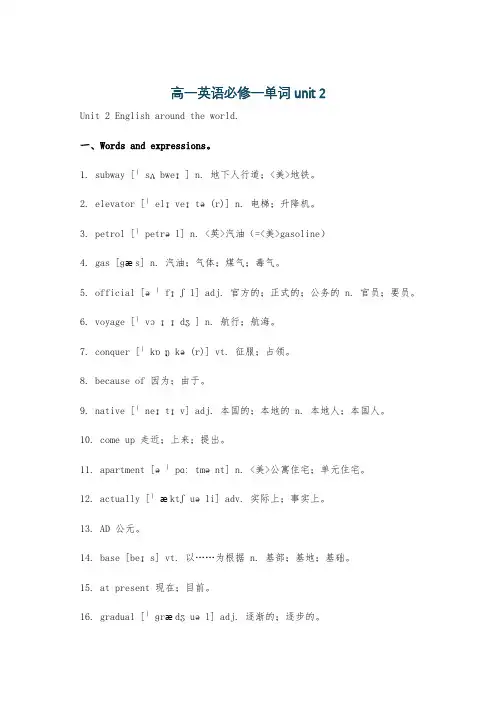
高一英语必修一单词unit 2Unit 2 English around the world.一、Words and expressions。
1. subway [ˈsʌbweɪ] n. 地下人行道;<美>地铁。
2. elevator [ˈelɪveɪtə(r)] n. 电梯;升降机。
3. petrol [ˈpetrəl] n. <英>汽油(=<美>gasoline)4. gas [ɡæs] n. 汽油;气体;煤气;毒气。
5. official [əˈfɪʃl] adj. 官方的;正式的;公务的 n. 官员;要员。
6. voyage [ˈvɔɪɪdʒ] n. 航行;航海。
7. conquer [ˈkɒŋkə(r)] vt. 征服;占领。
8. because of 因为;由于。
9. native [ˈneɪtɪv] adj. 本国的;本地的 n. 本地人;本国人。
10. come up 走近;上来;提出。
11. apartment [əˈpɑːtmənt] n. <美>公寓住宅;单元住宅。
12. actually [ˈæktʃuəli] adv. 实际上;事实上。
13. AD 公元。
14. base [beɪs] vt. 以……为根据 n. 基部;基地;基础。
15. at present 现在;目前。
16. gradual [ˈɡrædʒuəl] adj. 逐渐的;逐步的。
17. gradually [ˈɡrædʒuəli] adv. 逐渐地;逐步地。
18. Danish [ˈdeɪnɪʃ] n. 丹麦语 adj. 丹麦的;丹麦人的;丹麦语的。
19. enrich [ɪnˈrɪtʃ] vt. 使富裕;充实;改善。
20. vocabulary [vəʊˈkæbjələri] n. 词汇;词汇量;词表。
21. Shakespeare [ˈʃeɪkspɪə(r)] 莎士比亚(英国剧作家,诗人)22. make use of 利用;使用。
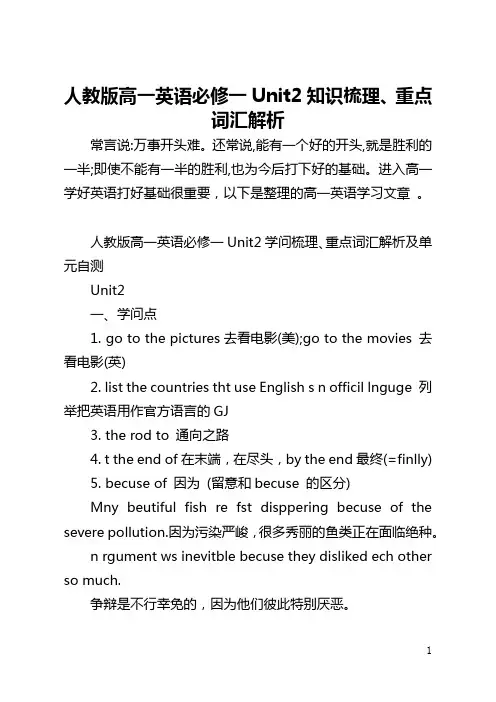
人教版高一英语必修一Unit2知识梳理、重点词汇解析常言说:万事开头难。
还常说,能有一个好的开头,就是胜利的一半;即使不能有一半的胜利,也为今后打下好的基础。
进入高一学好英语打好基础很重要,以下是整理的高一英语学习文章。
人教版高一英语必修一Unit2学问梳理、重点词汇解析及单元自测Unit2一、学问点1. go to the pictures去看电影(美);go to the movies 去看电影(英)2. list the countries tht use English s n officil lnguge 列举把英语用作官方语言的GJ3. the rod to 通向之路4. t the end of在末端,在尽头,by the end最终(=finlly)5. becuse of 因为(留意和becuse 的区分)Mny beutiful fish re fst disppering becuse of the severe pollution.因为污染严峻,很多秀丽的鱼类正在面临绝种。
n rgument ws inevitble becuse they disliked ech other so much.争辩是不行幸免的,因为他们彼此特别厌恶。
6. ntive English spekers 以英语作为母语的人7. even if (= even thoug)即使,用来引导一个让步状语从句,后面既可用陈述语气,也可用虚拟语气,但是even if/even though,引导的从句中不用将来时。
如:Even though/if it rins tomorrow, we will leve for Beijing.8. come up 走上前来,走近,发生,出现come up with 追上,赶上,提出9. ctully ll lnguges chnge nd develop when cultures meet nd communicte with ech other.事实上,当不同文化互相沟通渗透时,全部的语言都会有所进展、有所改变。
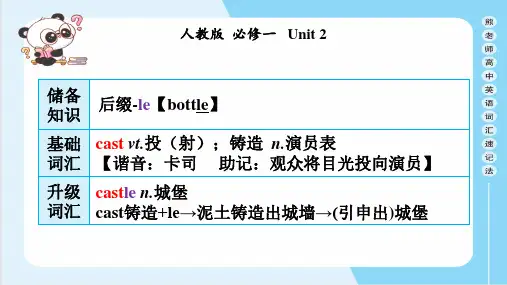
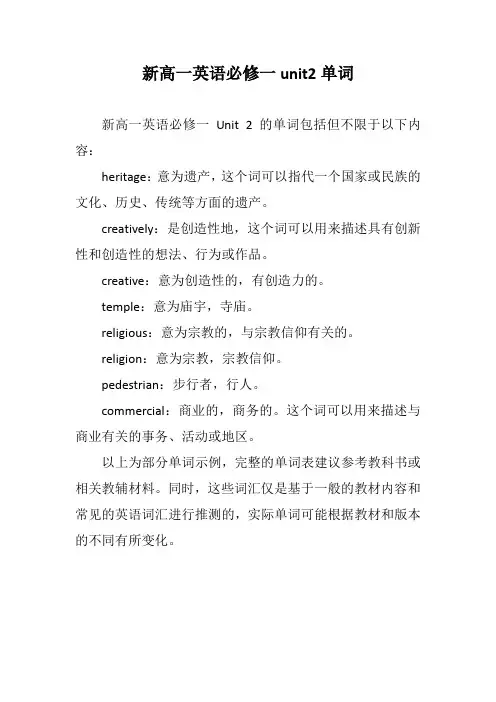
新高一英语必修一unit2单词
新高一英语必修一Unit 2的单词包括但不限于以下内容:
heritage:意为遗产,这个词可以指代一个国家或民族的文化、历史、传统等方面的遗产。
creatively:是创造性地,这个词可以用来描述具有创新性和创造性的想法、行为或作品。
creative:意为创造性的,有创造力的。
temple:意为庙宇,寺庙。
religious:意为宗教的,与宗教信仰有关的。
religion:意为宗教,宗教信仰。
pedestrian:步行者,行人。
commercial:商业的,商务的。
这个词可以用来描述与商业有关的事务、活动或地区。
以上为部分单词示例,完整的单词表建议参考教科书或相关教辅材料。
同时,这些词汇仅是基于一般的教材内容和常见的英语词汇进行推测的,实际单词可能根据教材和版本的不同有所变化。
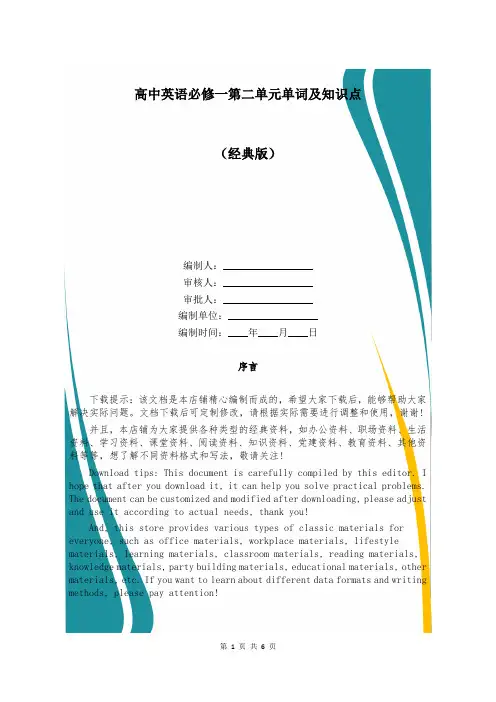
高中英语必修一第二单元单词及知识点(经典版)编制人:__________________审核人:__________________审批人:__________________编制单位:__________________编制时间:____年____月____日序言下载提示:该文档是本店铺精心编制而成的,希望大家下载后,能够帮助大家解决实际问题。
文档下载后可定制修改,请根据实际需要进行调整和使用,谢谢!并且,本店铺为大家提供各种类型的经典资料,如办公资料、职场资料、生活资料、学习资料、课堂资料、阅读资料、知识资料、党建资料、教育资料、其他资料等等,想了解不同资料格式和写法,敬请关注!Download tips: This document is carefully compiled by this editor. I hope that after you download it, it can help you solve practical problems. The document can be customized and modified after downloading, please adjust and use it according to actual needs, thank you!And, this store provides various types of classic materials for everyone, such as office materials, workplace materials, lifestyle materials, learning materials, classroom materials, reading materials, knowledge materials, party building materials, educational materials, other materials, etc. If you want to learn about different data formats and writing methods, please pay attention!高中英语必修一第二单元单词及知识点人教版高中英语必修一第二单元单词及知识点很多学生在初中的时候没有好好学习英语 ,导致上了高一之后英语基础还是很差。
人教版高一英必修一Unit2 知点梳理及1.official adj.官方的;正式的;公的e.g. There will be an official inquiry into the matter.将件事行正式。
【拓展】 official 或 officer 二者都有官的意思,可是所指不一样。
official 常指政府官或行政官 officer 常指身特定制服的官,如官或许警官等。
【】 My father is an________ in the army, while his father is an________ in the government.2.voyage n.航行;航海;航天辨析: voyage/journey/travel/trip/tour1) voyage: 去外国或地方的海上旅行make a voyage 行一次航行 e.g.Columbus succeeded in making a voyage to America in 1942.2)journey: 指的从一地到另一地旅行,距离,多指地 e.g. Theywill make a journey to Beijing by train.3) travel:一系列的旅途,泛指旅行 e.g. We had six days’ travel by car.4)trip: ( 短途 )旅行 e.g. The Greens will take a weekend trip to the Great Wall.5)tour:了公、或教育参多名的旅行e.g. We will make a tour of Hainan next week.【】用上边所供给的辨析的适合形式填空1). It is tiring to take a long _______ by train from Paris to Moscow.2). The _________ from England to Australia used to take several months.3). We’ll have time for a ______ to France next weekend.4). We went on a guided ______ round the castle.3. because of 因;因为e.g. They are here because of us他.是因我来里的。
高一英语必修一unit2知识点高一英语必修一unit2知识1重点词汇、短语1. because of 因为、由于2. e up 走近、上来、提出3. actually 实际上、事实上4. base 以…为基础,根基5. at present 目前6. make use of 利用7. such as 例如8. mand 命令、指令、掌握9. request 请求、要求10. play a part/role in 扮演一个角色11. recognize 辨认出、承认、公认12. straight 直接、挺直、笔直的13. be different from 与…不同be the same as 和…一样14. one another 相互,彼此(=each other)15. at the end of 在…结束时16. because of 因为(后接名词或名词性短语)because 因为(后接句子)17. be based on 根据,依据18. at present 目前;当今19. especially 特别,尤其specially 专门地20. make use of 利用…make the best of 充分利用…21. a large number of 大量的,很多(作主语时,谓语动词用复数)the number of …的数量(作主语时,谓语动词用单数)22. in fact = actually= as a matter of fact 事实上23. make lists of… 列清单24. included 包括(前面接包括的对象)including包括(后面接包括的对象)25. mand sb. to do sth. 命令某人去做某事mand + that 从句(从句用should+V原)26. request sb. to do sth. 要求某人做某事request + that 从句(从句用should+V原)高一英语必修一unit2知识2重点句型1. World Englishes e from those countries where English plays an important role as a first or second language, either because of foreign rule or because of its special role as an international language.(定语从句)世界英语来自那些以英语为第一或第二语言的国家,英语在这些国家起重要作用,或是因为外国的统治,或是因为其作为国际语言的特殊地位。
高一英语必修一词汇讲解Unit 21.more than one kind of English该短语中more than 与数词连用,意思是“超过,多于”,相当于over.【要点】more than one+n. 意为“不止一个”,虽在语义上为复数,但作主语时,谓语动词用单数形式。
More than one house was burnt down in the fire.不止一间房屋在火灾中被烧毁。
More than one person has a good grasp of English in the school.在这所学校里不止一个人精通英语。
more than 还可与名词、形容词、副词、动词、动名词或分词连用,意为“不只是,岂止”等。
Both of them are much more than schoolmates . They are close friends.他们俩远不止是同学,更是知心朋友。
e up 走近;上来;提出;露出地面,发芽The sun has come up. 太阳升起来了。
The seeds haven’t come up yet. 种子还没有发芽。
The question hasn’t come up yet. 问题尚未被提出。
He came up to me and said sorry.他走近我并道了歉。
【要点】come up 作“提出”讲时,由被提出的物作主语,无被动形式;而come up with 指人提出问题等,用人作主语。
come up 作“发生,出现”讲时,多用于事物作主语;以人作主语表示“出现,到场”,常用turn up.【词组拓展】3.a number of 许多,大量的,谓语动词为复数the number of ……的数量,谓语动词为单数Quite a number of young people believe that money is a passport to happiness.相当多的年轻人认为金钱是幸福的保证。
The number of graduates has increased over these years.近年来毕业生的数量大幅上升。
4.present adj.现在的,当前的(常作前置定语);出席的,到场的(常作后置定语);n.礼物;现在v.赠送;介绍;呈递;授予He doesn’t know how to deal with the present situation.他不知道怎样应对当前的局势。
The people present at the meeting are advanced workers. 出席会议的人都是先进工作者。
John was presented with his award at the ceremony.在颁奖大会上,约翰被授予奖赏。
【常见词组】be present at the meeting 出席会议be present to 出现在……be present to mind 放在心上,记忆犹新at present 目前,现在把某物赠送给某人:make a present of sth. to sb. make sb. a present of sth.present sth. to sb. present sb. with sth.5.close to 靠近,接近【辨析】close 与closelyclose和closely均可用作副词,close可用作形容词,但close多用来修饰由介词引导的短语,强调“距离”的概念;而closely则用来修饰动词或过去分词,强调抽象的“紧密地”含义。
Someone followed close behind me. 有人紧跟着我。
This problem is closely connected with that one. 这个问题与那个问题有密切的联系。
6.howeverhowever可用作副词,意为“可是,然而”,位置灵活,用逗号与其他部分隔开。
It’s raining hard;however, I think we should go out. 雨下得很大,不过我想我们还是应该出去。
【拓展】however 也可作“无论如何,不管怎样”讲,引导让步状语从句,相当于no matter how, 后接形容词或副词。
We’ll have to finish it ,however / no matter how long it takes. 不管要花多长时间,我们都必须把它做完。
7.at the end of(1)在……的末梢,到……的尽头,表场所At the end of the road you’ll find the factory easily.在这条路的尽头,你会很容易找到那家工厂。
(2)在……结束时,在……末,表时间I came across an old friend at the end of last month. 上个月底,我偶然遇到了一位老朋友。
8.make use of 利用,使用,与take advantage of 同义You must make good use of any opportunity to practice English. 你必须好好利用一切机会练习英语。
【use常用词组】make use of 利用,使用come into use 投入使用in use 正在用,通用use up 用完,耗尽9.expect (理所当然地)期望;预料,预期;认为【常用搭配用法及句型】expect sb. to do sth. 期望(预料)某人做某事expect sth. 预料某事(乞求某物)expect to do sth. 想要(打算)做某事expect+ that 从句,预料(认为)……I expect so. 我想是这样的。
I expect not. 或I don’t expect so. 我想不是这样的。
10.request n. & vt.请求,要求【搭配归纳】at the request of sb. = at sb.’s request 应某人的要求He went to Jinan at the request of his manager. 他应经理的要求去了济南。
request sb. to do = request + that 从句(should+动词原形)要求某人做某事(should 可以省略)She requested that we (should) go home right now. 她要求我们现在就回家。
request sth. from sb. 向某人索要某物Liming requested a computer from his parents. 李铭像父母索要一台电脑。
make a request for sth. 要求某物;需要某物They have made q request for international aid. 他们已经要求国际紧急援助。
make a request that ... 要求,需要……At the meeting , the manager made a request that we get to the company before 7:45 tomorrow morning. 在会上,经理要求我们明天早上7:45 之前到公司。
mand n. & vt. 命令,指令;掌握【要点】command 可用作可数名词,意为“命令,指令,指挥部”,如:give a command 下命令。
也可用作不可数名词,意为“控制,指挥;运用能力,掌握”。
【拓展】have (a) good command of 精通……at one’s command 随心所欲be in command of 统帅……be under one’s command 由……指挥command sb. to do sth. 命令某人做某事command + that 从句,命令某事,从句用虚拟语气,谓语部分用“should+动词原形,should 可省略。
12.believe it or not 信不信由你,常用作插入语。
类似的插入语还有:to tell you the truth 跟你说实话generally speaking 一般来说judging from 根据……判断that is to say 也就是说what’s more 而且what’s worse 更糟糕的是13.no such thing 没有这样的事such与no, all, most, some, any, many, much, a few, few , a little 等词连用时,such 应置于这些词之后。
There are many such books on sale in the bookstore. 书店里有很多这样的书在出售。
There is no such person here. 这儿没有这样一个人。
14.recognize 辨认出;承认;公认;赏识,表彰【常用搭配】recognize one’s voice 辨别出某人的声音be recognized as 被承认/认为是……recognize sb. to be 承认/认为某人是……recognize that 承认……Lisa, I didn’t recognize you!You have your hair cut! 丽萨,我没认出你来!你剪头发了!The policeman recognized him to be a pickpocket. 警察认出他是个小偷。
I recognized that I had made a mistake. 我认识到自己犯了一个错误。
The government recognized his excellent service by giving him a medal.政府为他颁发勋章,以表彰他的卓著功绩。
15.the same ...as... 跟……一样,与be different from 意思相反。
注意前后比较的项要一致。
Your opinion is the same as mine. 你的观点和我的一样。
不能说:Your opinion is the same as I/me.注意以下搭配的不同含义:the same... as 表示同类事物Could you buy me the book as you read yesterday? 你能给我买一本和你昨天看的一样的书吗?the same ...that 表示同一事物,也可用the same... asShe is the same girl as / that came yesterday. 昨天来的就是这个女孩。